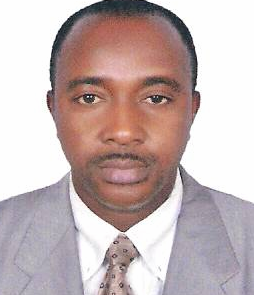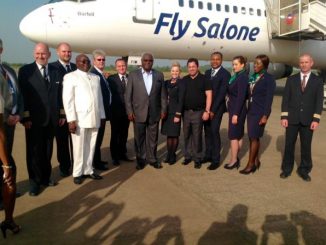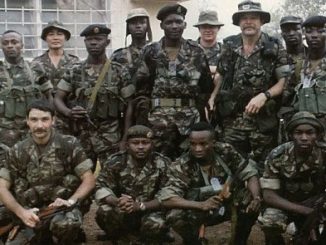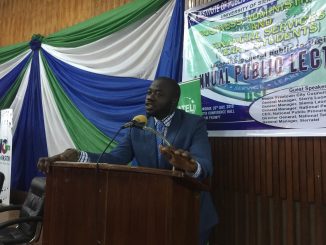
By Alhaji M.B. Jalloh, Information Attaché, Saudi Arabia :
A remarkable development took place in Sierra Leone on Tuesday 30th July, 2013 when His Excellency the President Dr. Ernest Bai Koroma, formally launched a Constitutional Review Committee (CRC) in fulfillment of his commitment during the last opening of Parliament.
In his key note address at the launch of the CRC hosted at the Miatta Conference Centre, Brookfields, Freetown, the President recounted the history of Sierra Leone’s constitutional development, noting that, the country has the deepest tradition of written constitutionalism in West Africa – from Granville Sharpe in the 19th Century, the Blackhall Constitution of 1863, the Slater Constitution of 1924, the Stevenson Constitution of the 1950s to the current 1991 National Constitution.
President Koroma, who proved on that day to be well grounded in Sierra Leone’s political history, spoke in exultation of our values and aspirations as Sierra Leoneans and suggested that, let tolerance be expected and deepened in the new constitution. He appealed for a ‘people’s constitution’ that will be easy to understand since we are a friendly people. “It must reflect the fundamental value of the Realm of the Free,” the Chief Executive stressed. He warned against acrimony, imposition and deposition, which he said “must not be repeated in our country”.
ALHAJI JALLOH
Though the 1991 Constitution makes provision (section 108) for its renewal, which constitutional mandate the Koroma-administration is obeying following calls by the TRC Report, the international community, civil society groups, professional organizations and individuals citizens, President Koroma has shown a genuine concern over the renewal of our constitution – one that should be drawn up in line with our aspirations, tolerance, culture and our democratic system.
Not only does the Constitutional Review Committee comprised eighty (80) Sierra Leoneans from various walks of life, the President has also appealed for greater participation of Sierra Leoneans at home and abroad, so that at the end of the day, the reviewed constitution will be the “people’s constitution”.
The President quoted in Exodus 18: 21 of the Holy Bible that “governments must be constituted from amongst persons who are able, persons who fear God, and persons of truth who hate covetousness”. Islamic traditions, the President added, also call for governance to be based on a ‘Shura’ of wise counsels that respects majority opinion, protect the vulnerable and uphold justice.
He admonished the committee not to seek to impose its ideas on the people of Sierra Leone, while urging all Sierra Leoneans to support the process, fully participate and take ownership of it.
According to the President, “Good constitutions are not imposed”. He believes that this process should be all embracing, inclusive, acceptable and representative, so that generations yet unborn shall refer to this moment to give voice to our work.
Since the launch of the CRC by the President, debate on the 1991 Constitution is ongoing and many Sierra Leoneans at home and in the Diaspora are making every meaningful contributions as to what should be amended or expunged from that constitution.
The debate is very interesting because it does not only show that Sierra Leoneans are honouring the call by President Koroma for every citizen to come on board, but it also demonstrates the desire by citizens to have their constitution changed to not only meet best international practice but to also meet the challenges that were unforeseen by its writers.
Indeed, certain sections of the 1991 Constitution need to be amended as rightly observed by some speakers during the launch ceremony, including Paramount Chiefs and Members of Parliament, particularly, Hon. Charles Caulker, who praised His Excellency for his resolve to order the review of the constitution, but however observed that the local court Acts of 1963 and 2011 have been undermined by the establishment of institutions that run parallel to these laws.
Contributions by many representatives on the high table on that day suggested that our national constitution needs a review. But what is more impressive is the genuine concern shown by the Koroma-administration to listen to the voice of the majority of Sierra Leoneans by taking on the herculean task which involves financial and human resources, as well as time and energy.
The government has also met its commitment by providing US$ 1.1 million out of US$ 4.6 million needed by the Review Committee. What else can this government do to show that it is fully committed to the review of our national constitution?
Even so, there are still detractors out there peddling rumours that the intention of government for ordering the Review Committee to commence work is to tamper with our constitution in favour of the ruling regime. These rumours have been around for quite some time despite the official Government Spokesperson and his office have repeatedly distanced the President from what they referred to as a “Figment of their imagination”.
They have said repeatedly that President Koroma has again proved to the world that he is the ‘Father’ of our ‘Modern Democracy’. By appealing to all Sierra Leoneans to put regionalism, ethnicity and partisanship aside and make meaningful contribution to the constitutional review process, President Koroma has exhibited patriotism, love and passion to his people for which he should be commended by all Sierra Leoneans.
We should continue to support the President in all his endeavours if one wants him to succeed. With our support, he successfully implemented the ‘Agenda for Change’ which worked in his favour during his re-election in November 2012. His development strides have changed the state of the country in terms of infrastructure, electricity, free healthcare delivery and many other social infrastructures that were destroyed or damaged during the rebel war. President Koroma is indeed a true ‘Father’ of democracy whose efforts in the last six years to improve our economic growth and attract foreign investors have impacted positively on majority of Sierra Leoneans.





Leave a Reply